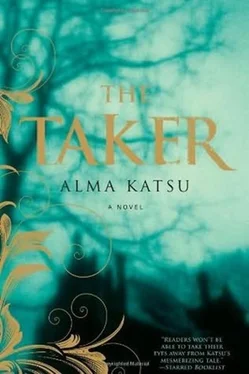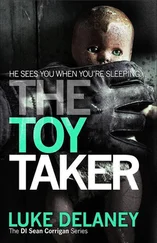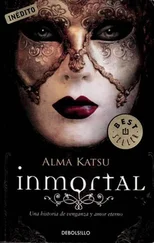“The same tattoo?”
“No,” she says, giving the tattoo a swipe with her thumb. “But it’s the same size and it was done by the same person, so it will look similar, like it was done with pins dipped in ink, because it was. His looks like two comets circling each other, with the tails extended.”
“What does it mean? The comets?” Luke asks.
“Damned if I know,” she replies, rearranging the gown and bedding. “Just go look at Jonathan, and then tell me if you don’t believe me.”
After he ties her up again-inefficiently, with rarely used straps kept on hand for unruly patients-Luke Findley rises from the stool. He slips through the swinging doors, checking first to make sure no one sees him leave. The hospital is still dark and quiet, with only faint movement in the distant pools of light illuminating the nurses’ station down the hall. His shoes squeak against the clean linoleum floor as he hurries down the staircase, heading north through a basement corridor that leads to the morgue.
The whole way his nerves jangle. If someone stops him and asks what he’s doing out of the ER, why he’s going to the morgue, he’ll just tell them… His mind goes blank. Luke has never been a good liar. He sees himself as a fundamentally honest person, for whatever good that has done him. Despite his honesty and his fear of getting caught, though, he has agreed to the prisoner’s outlandish suggestion because he is curious as to whether this dead person is the most beautiful man ever put on the planet and what the most beautiful man would look like.
He pushes open the heavy swinging door to the morgue. Luke hears music-the evening morgue attendant, a young man named Marcus, likes to have the radio playing at all times-but sees no one. His desk shows signs of occupation (the lamp glows brightly, papers are strewn about, a gum wrapper, an uncapped pen), but no Marcus.
The morgue is small, in keeping with the town’s modest needs. There is a refrigerated examination room farther back, but the bodies are stored in four cold vaults in the wall just past the entryway. Luke takes a deep breath and reaches for one of the latches, big and heavy like the latches on old-fashioned frozen food trucks.
In the first vault he finds the body of an elderly woman, unknown to him, which means she probably came from one of the towns farther out in the county. The woman’s short, thick body and white hair make him think of his mother, and for a moment he’s brought back to the last lucid conversation they had. He’d sat at her bedside in the intensive care unit while her unfocused eyes searched in his direction and her hand sought his out for comfort. “I’m sorry you had to come home to take care of us,” she’d said to him, his mother who never apologized because she never allowed herself to do anything that needed excusing. “Maybe we stayed on the farm a little too long. But your father, he wouldn’t give it up…” She stopped herself, unable to be disloyal to the old man so stubborn that he had hobbled out to the barn to milk the cows the morning of the day he died. “I’m sorry for what it did to your family…” Luke recalls trying to explain that his marriage was already coming apart long before he moved his family back to St. Andrew, but his mother wouldn’t hear any of it. “You never wanted to stay in St. Andrew, from when you were little. You can’t be happy here now. Once I’m gone, don’t let yourself get stuck here. You go and find a new life.” She started crying and kept trying to squeeze his hand, slipping into unconsciousness a few hours later.
It takes Luke a minute to realize the vault is still open and that he’s been standing there so long a chill has settled in his chest. It’s as if he can hear his mother’s voice in his head. He shivers and slides the tray back into the locker, then stands another minute until he remembers why he came to the morgue in the first place.
He finds a black body bag in the second vault and, with a grunt of exertion, pulls the tray out. The zipper slides down with a satisfying tearing sound, like the unpeeling of Velcro.
Luke opens the bag and stares. He’s seen many dead people over the years, and death does nothing to enhance appearance. Depending on how they died, the deceased may be bloated. There may be bruising or discoloration or they may be pale and bluing. There is always the unmistakable lack of animation to the features. This man’s face is nearly white and spotted with flecks of dark, wet leaves. His black hair is plastered to his forehead, his eyes closed. It doesn’t matter. Luke could stare at him all night. He is exquisite, even in death. He is breathtakingly, achingly beautiful.
Luke is about to push the tray back into the wall when he remembers the tattoo. He looks over his shoulder first in case Marcus might have returned, and then hurries, unzipping the bag farther and rearranging the clothing, to get to the dead man’s upper arm. And there it is, as Lanny had said it would be, two interlocked spheres with tails trailing off in opposite directions, and the dots look similar, in size, in the hand-done quality, down to the slight wobble of the line.
Retracing his steps through the empty halls to the emergency ward, Luke struggles with the jumble of thoughts, mostly questions. They are like matter and antimatter, canceling each other out, two truths that cannot both exist. He knows what he saw in the emergency room when the girl cut herself: it cannot have happened, and yet it did. He had touched that very spot on her torso, before and after the slash, so he knows there was no trick. But what he saw couldn’t have happened, not as he saw it.
Unless she is telling the truth. And now there is a handsome man in the morgue, and the tattoos… It all leaves him with the feeling that he needs to listen, to go along for a change. But he’s stubborn because he’s a man of science; he is not about to chuck everything he knows to be fact. He is, however, curious to learn more.
The doctor bursts through the door to the examination room in the darkened ER-his energy and nervousness in his chest like fireflies in a jar-to find the prisoner huddled on the gurney, caught in the downward shaft of light and the whirling motes of smoke. She could be an excommunicated angel, Luke thinks, her wings clipped.
Lanny looks at him hungrily. “So, did you see him? Wasn’t he everything I said he’d be?”
Luke nods. Beauty like that is its own kind of narcotic. He rubs his face, takes a deep breath.
“So now you understand,” Lanny says solemnly. “And if you believe me, Luke, help me. Untie me,” she says, arching her back and holding out the restraints, her sweet child’s face turned up to him. “I need you to help me escape.”

ST. ANDREW, 1811
Perhaps Jonathan and I would both have been better off if I had been born male. I’d rather have let our friendship continue and always have Jonathan in that way. We’d have spent our entire lives within the confines of that tiny village; I’d never have gotten into the trouble I did, never have suffered this terrible ordeal put upon both of us. Our lives would have been so small, but full and rewarding and complete, and I would have been happy with that.
But I was a girl, and for all my wishing there was no changing that. Ahead of me loomed the mysterious transition from girl to woman, as unfathomable to me as a magic trick. Whose example was I to follow? My mother, Theresa, wouldn’t be able to give me the kind of guidance I craved-she was too demure and quiet for my tastes; I did not want to be like her. I wanted more. I wanted to marry Jonathan, for instance, and it didn’t seem as though my mother would be able to teach me to be the type of woman who could make Jonathan her own.
Читать дальше













